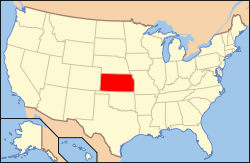LGBT rights in Kansas
| LGBT rights in Kansas | |
|---|---|
 | |
| Same-sex sexual intercourse legal status |
Legal since 2003 (Lawrence v. Texas) |
| Gender identity/expression | Altering sex on birth certificate not allowed |
| Discrimination protections | None statewide |
| Family rights | |
| Recognition of relationships | Yes |
| Adoption | Stepparent adoption illegal |
Lesbian, gay, bisexual, and transgender (LGBT) persons in the U.S. state of Kansas face some legal challenges not experienced by non-LGBT residents. Same-sex sexual activity is legal in Kansas.
Two lawsuits, one in state court and the other in federal court, challenged the constitutionality of the state's ban on same-sex marriage, and on November 4, 2014, a U.S. District Court judge ruled Kansas' ban on same-sex marriage unconstitutional. His ruling was stayed as the state sought a stay pending appeal without success, and it took effect on November 12, 2014. From November 12, 2014 to the Supreme Court's ruling in Obergefell v. Hodges on June 26, 2015, marriage licenses were generally available to same-sex couples, but the state government continued to deny recognition to same-sex marriages in all other respects.
Law regarding same-sex sexual activity
The U.S. Supreme Court's 2003 decision in Lawrence v. Texas rendered laws banning consensual sexual activity unenforceable, including that of Kansas.[1] State v. Limon, the first case decided under the Lawrence precedent, invalidated a provision of the state's Romeo and Juliet law that assigned harsher sentences in statutory rape cases where the parties were of the same sex.[2]
Recognition of same-sex relationships
Marriage
Same-sex marriage became legal in Kansas following the U.S. Supreme Court decision in Obergefell v. Hodges on June 26, 2015, which found the denial of marriage rights to same-sex couples unconstitutional. By June 29, the next business day after the decision, 25 of the state's 32 judicial districts were issuing licenses to same-sex couples, and some of those that were not had yet to receive an application from a same-sex couple.[3] Kansas for the previous decade had recognized neither same-sex marriages nor any other form of legal recognition of same-sex unions. The state explicitly banned same-sex marriage and all other types of same-sex unions both by statute and by constitutional amendment.
The state's definitions and restrictions had been challenged in several lawsuits. On October 7, 2014, officials in Johnson County began accepting licenses for marriage applications, due to the Supreme Court's recent refusal to hear a Utah case now binding on Kansas. The state attorney general filed a lawsuit in order to stop those actions. One couple obtained a marriage license and married on October 10, on the steps of the Johnson County courthouse. On October 10, 2014, the Kansas Supreme Court ordered officials in Johnson County to stop issuing marriage licenses to same-sex couples, though it allowed for court clerks to accept applications for marriage licenses from same-sex couples. It scheduled a hearing for November 6.[4]
On November 18, 2014, the Kansas Supreme Court ruled that Johnson County had been within its jurisdiction to issue marriage licenses to same sex couples based on its interpretation of the law. It lifted the stay on Johnson County from issuing the licenses, but did not direct other counties to issue them.[5]
Judge Daniel D. Crabtree heard oral arguments on October 31, 2014 in another lawsuit in U.S. district court, Marie v. Moser.[6] He found the state's ban on same-sex marriage unconstitutional on November 4, but stayed enforcement of his ruling for a week.[7] The state sought a stay pending appeal without success from the Tenth Circuit Court of Appeals, and Crabtree's order preventing the state from enforcing its ban on same-sex marriage took effect on November 12 when the U.S. Supreme Court declined his request for a stay pending appeal.[8]
Domestic partnership

The cities of Lawrence and Topeka have established domestic partnership registries.[9][10]
Adoption and parenting
In November 2012, the Kansas Court of Appeals ruled in the case In the Matter of the Adoption of I. M. that a single person who is not a biological parent of a child cannot petition to adopt that child without terminating the other parent's parental rights. Since Kansas does not recognize same-sex marriages, this ruling effectively prevents same-sex couples from second-parent adoption in Kansas.[11] However, the Kansas Supreme Court ruled on February 22, 2013, in Frazier v. Goudschaal that a partner of a biological parent may receive parental rights according to the best interest of the children in some circumstances, such as where there is no second parent and thus no termination of parental rights is involved, and the partner has assumed a parenting role of the children.[12]
Discrimination protections

Between 2007 and 2015, Kansas prohibited discrimination on the basis of sexual orientation or gender identity in government employment on the basis of an executive order issued by Governor Kathleen Sebelius in August 2007.[13] Governor Sam Brownback rescinded that order on February 10, 2015.[14]
The cities of Lawrence,[15] Topeka,[16] and Roeland Park[17] prohibit discrimination on the basis of sexual orientation or gender identity in government and private employment. The county of Shawnee[18] prohibits discrimination on the basis of sexual orientation only in public employment.
On November 6, 2012, the voters of the cities of Salina and Hutchinson both voted to repeal both cities anti-discrimination ordinances on the basis of sexual orientation and gender identity.[19]
In January 2014, Kansas House Bill 2453 was introduced which would allow people motivated by religious opposition to same-sex relationships to refuse to provide services to same-sex couples.[20] On February 12, the Kansas House of Representatives passed the legislation by a 72–49 vote.[21] The Kansas Senate did not take up the legislation.[22] It was part of a broader movement to anticipate resistance to the recognition of same-sex marriages.[23]
At present, Kansas' hate crime law covers violence based on sexual orientation. It does not cover gender identity.
Senate Bill 175
References
- ↑ New York Times: "Supreme Court Strikes Down Texas Law Banning Sodomy," June 26, 2003, access April 16, 2011
- ↑ State v. Limon, 280 Kan. 275, 122 P.3d 22, October 21, 2005.
- ↑ Morrison, Oliver (June 29, 2015). "Some Kansas judges will not say whether they will issue same-sex marriage licenses". Wichita Eagle. Retrieved June 29, 2015.
- ↑ Johnson, Chris (October 10, 2014). "Kansas AG seeks to halt same-sex marriages in his state". Washington Blade. Retrieved October 10, 2014.
- ↑ https://www.reuters.com/article/2014/11/19/us-usa-gaymarriage-kansas-idUSKCN0J305X20141119
- ↑ Hanna, John (October 31, 2014). "Kansas Urges Judge Not to Rule on Gay Marriage". ABC News. Associated Press. Retrieved October 31, 2014.
- ↑ Johnson, Chris (November 4, 2014). "Judge rules against Kansas same-sex marriage ban". Washington Blade. Retrieved November 4, 2014.
- ↑ Snow, Justin (November 12, 2014). "Supreme Court allows Kansas same-sex marriages to proceed". Metro Weekly. Retrieved November 12, 2014.
- ↑ Kellaway, Mitch (2014-05-28). "Topeka, Kan., Now Protects Gender Identity, Domestic Partnerships". Advocate.com. Retrieved 2014-06-29.
- ↑ Lawhorn, Chad (August 1, 2007). "Domestic partnership registry opens today". Lawrence Journal-World. Retrieved February 18, 2014.
- ↑ In re I. M. (Kan. Ct. App. 2012). Text
- ↑ (PDF) http://www.kscourts.org/Cases-and-Opinions/Opinions/SupCt/2013/20130222/103487.pdf. Retrieved 2013-11-02. Missing or empty
|title=(help) - ↑ "Sebelius order protects gay, lesbian state workers". Kansas City Business Journal. August 31, 2007. Retrieved February 18, 2014.
- ↑ "Brownback rescinds executive order that offered protections on basis of sexual orientation". The Topeka Capital-Journal. February 10, 2015. Retrieved February 10, 2015.
- ↑ "Cities and Counties with Non-Discrimination Ordinances that Include Gender Identity". Human Rights Campaign. Retrieved May 25, 2013.
- ↑
- ↑
- ↑ SHAWNEE COUNTY HUMAN RESOURCES POLICY MANUAL December 2008
- ↑ "Salina & Hutchinson repeal anti-discrimination protections". Archived from the original on October 23, 2013. Retrieved 2013-11-02.
- ↑ Lowry, Brian (February 14, 2014). "Kan. Senate president: Bill that allows service refusal to same-sex couples on religious grounds unlikely to pass". The Wichita Eagle. Archived from the original on February 15, 2014. Retrieved February 15, 2014.
- ↑ "Kansas House passes bill allowing refusal of service to same-sex couples". Cnn.com. 2014-02-13. Retrieved 2014-06-29.
- ↑ Hanna, John (February 18, 2014). "Kansas Senate won't consider gay couples discrimination bill". Topeka Capital-Journal. Retrieved February 19, 2014.
- ↑ Merevick, Tony (February 19, 2014). "In One Day, Bills Allowing Anti-LGBT Discrimination Fail In Four States". BuzzFeed. Retrieved February 19, 2014.